1.英语语法综述
句子的分类
- 简单句(Simple Sentences)的构成
- 简单句的组合(compound sentences复合句/并列句, complexs entences复杂句)
- 复合句:句子简单叠加
- 复杂句:句子套娃。有主句Main Clause和从句Subordinate Clause,从句由简单句修改而来,充当句子成分
- 名词性从句
- 简单句作主语:主语从句
- 简单句作宾语:宾语从句
- 简单句作表语:表语从句
- 简单句作同位语:同位语从句
- 其它从句
- 简单句作定语:定语从句
- 简单句作状语:状语从句
句子成分(Clause Elements)
- 主语(Subject 什么)+谓语(Predicate 怎么样)
- 主语:人/物;谓语:动作(动词Verbs)/发生了什么事
- 可以独立完成的动作(Intransitive Verbs 不及物动词)
Papa Rabbit sleeps
主语+不及物动词 - 有1个动作的承受者(Transitive Verbs 及物动词/Monotransitive Verbs 单及物动词),加宾语(Obejct)
Papa Rabbit likes you
主语+单及物动词+宾语 - 有2个动作承受者(Ditransitive Verbs 双及物动词),加间接宾语(Indirect Obejct)和直接宾语(Direct Obejct)
Papa Rabbit teaches you English
主语+双及物动词+间接宾语+直接宾语 - 只有1个动作承受者,但需补充(Complex-Transitive Verbs 复杂及物动词),加宾语补语(Object Complement)
Papa Rabbit considers you smart
主语+复杂及物动词+宾语+(宾语)补语 - 非"动作"(Linking Verbs 连系动词/系动词),接主语补语(Subject Complement)/表语(Predicative)
Papa Rabbit is/looks tall(把tall赋予给Papa Rabbit)
主语+系动词+(主语)补语/表语
- 可以独立完成的动作(Intransitive Verbs 不及物动词)
- 定语(Attributive)
修饰主语或宾语- The little white rabbit ate a large carrot.、
- 状语(Adverbial)
修饰谓语动词- The rabbit ate quickly.
- 同位语(Appositve)
再把主语或宾语说一遍- Papa Rabbit, an English teacher, eats carrots.
句子词类(Parts of Speech)
- 动词(Verbs)
- 名词(Nouns)
表人和物- Papa Rabbitis a rabbit
- 冠词(Articles)
说明人和事物- Papa Rabbit is a rabbit
- 代词(Pronouns)
替代人和物- I am a rabbit
- 形容词(Adjectives)
形容人和物- I am a smart rabbit
- 数词(Numerals)
表数量- I ate two carrots
- 副词(Adverbs)
修饰动作或形容词等- I ate two carrots quickly
- 介词(Prepositions)
表示和其他词关系的词- I ate two carrots with chopsticks
- 叹词(Interjections)
表感叹- Ah, the carrot is tasty
- 连词(Conjunctions)
连接词和句- I ate two carrots and a potato, because I was hungry
句子成分除了谓语是动词(又叫谓语动词),其它成分可能包含任意词类
谓语动词“三大本领”
-
动作的时间(Tense时)
现在、过去、将来、过去将来(从过去某个时间点算将来) -
动作的状态(Aspect体)
一般、完成、进行、完成进行(不但完成了而且继续)以上两种合称时态,理论上有16种时态
-
动作的假设、情感(Mood气)
- 虚拟语气
If I were a rabbit... - 陈述语气
I ate a carrot and... - 祈使语气
Eat this carrot and ...
- 虚拟语气
助动词(Auxiliary Verbs)
帮助谓语动词完成“三大本领”
- 表示"吃过了(完成)"
- have eaten
- 表示"正在吃(进行)"
- is eating
- 表示"被吃"
- is eaten
- 表示"有能力吃"
- can eat
- 表示"有可能吃"
- might eat
- 表示"有义务吃"
- must eat
- 表示"不吃(否定)"
- do not eat
非谓语动词
- 几乎可以取代所有的从句,从而简化句子
- 不具有谓语动词的“三大本领”
- 非谓语动词的形式
- 动词不定式(长得和谓语动词原型一样)
Rabbits eat carrots ×
To eat or not to eat √ - 现在分词(长得和谓语动词进行时一样)
- 动名词(长得和谓语动词进行时一样)
The rabbit is eating ×
Eating everything, I survived √
Eating carrots is healthy √ - 过去分词(长得和谓语动词完成时一样)
The rabbit has eaten ×
This is a half-eaten carrot √
- 动词不定式(长得和谓语动词原型一样)
2.动词分类
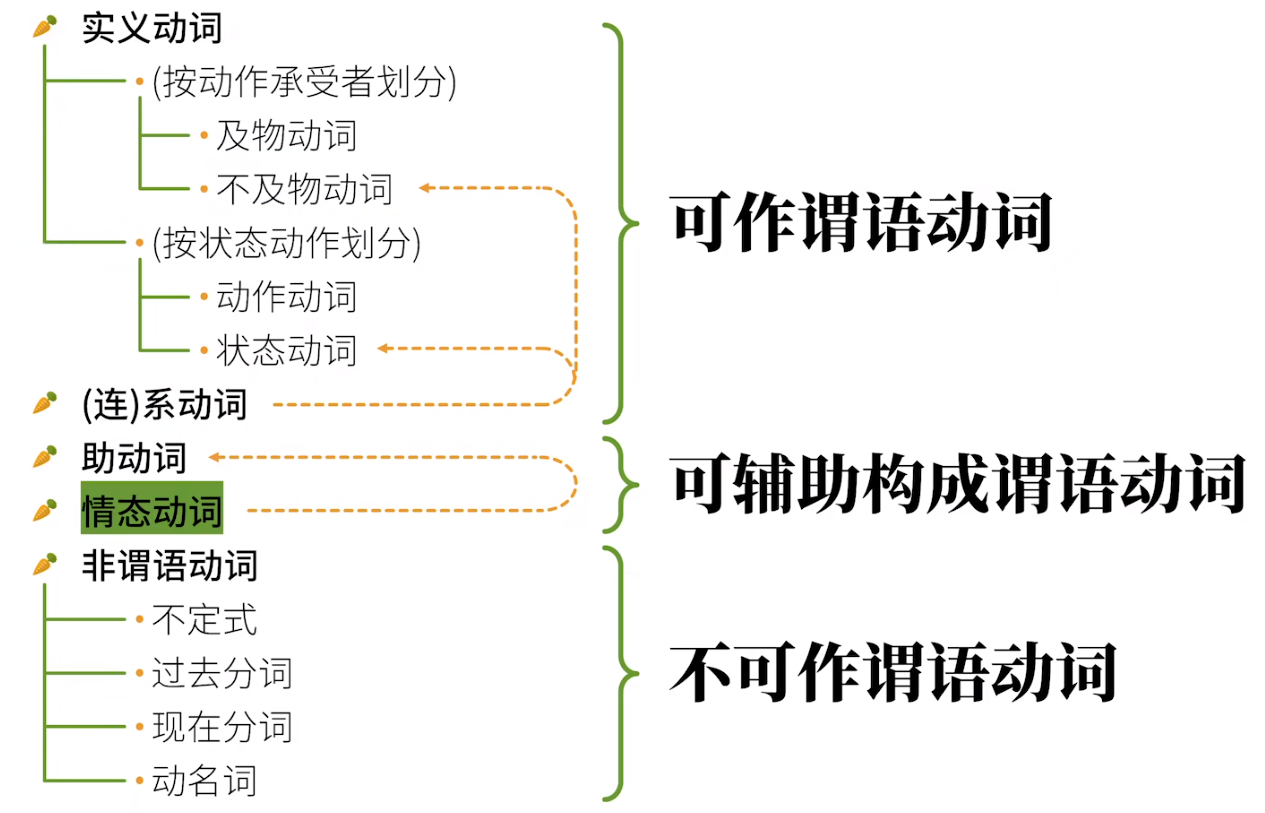
谓语动词
- 实义动词
- 按动作承受者
及物动词
不及物动词 - 按状态动作划分
动作动词,eat
状态动词,feel
- 按动作承受者
- 系动词
辅助构成谓语动词
- 助动词
- 情态动词
非谓语动词
- 不定式
- 过去分词
- 现在分词
- 动名词
3.动词时态
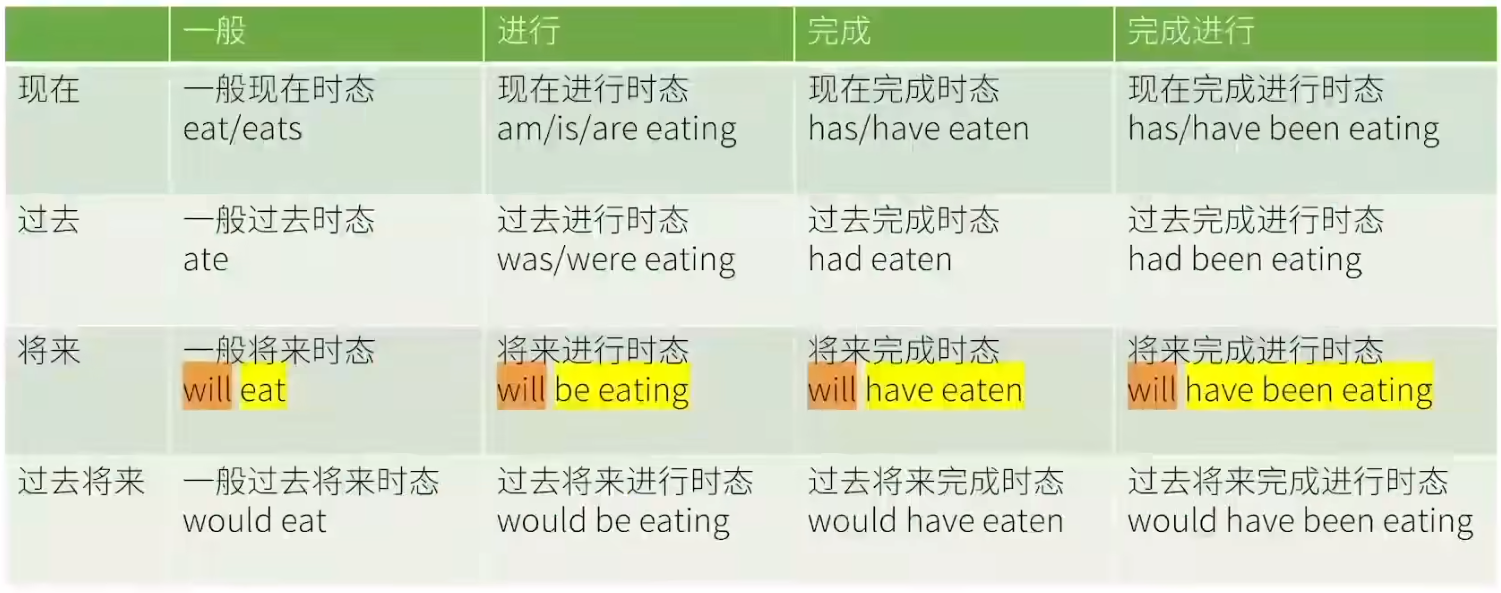
现在进行时(Present Progressive Tense)
- 兔子正在吃胡萝卜
- 助动词be的变位(am is are)+动词的现在分词
- You/we/they are eating a carrot
现在完成时(Present Perfect Tense)
- 兔子现在已经吃完了胡萝卜
- 助动词have的变位(have has)+动词的过去分词
- I have eaten carrots
现在完成进行时(Present Perfect Progressive Tense)
- 兔子现在已经吃完了一些胡萝卜,还要继续吃
2.现在完成:have的变位+动词的过去分词
进行:be的变位+动词的现在分词
所以:have的变位+been+动词的现在分词 - I have been eating carrots
一般现在时(Simple Present Tense)
- 兔子吃胡萝卜
- 动词原形/+动词原形+s(第三人称单数)
- 表达事实。The sun rises in the east
表达习惯/重复的动作。I play basketball
表示预计发生的事。The bus leaves at 8PM tonight.
过去进行时(Past Progressive Tense)
- 兔子昨天下午3点那个时候正在吃胡萝卜
- 助动词be的变位(was were)+动词的现在分词
- The rabbit was eating a carrotd
过去完成时(Past Perfect Tense)
- 兔子昨天下午3点那个时候已经吃完了胡萝卜
- 助动词have的变位(had)+动词的过去分词
- I had eaten 5 carrots for lunch yesterday
过去完成进行时(Past Perfect Progressive Tense)
- 兔子昨天下午3点那个时候已经吃完了一些胡萝卜,还要继续吃
- 助动词have的变位(had)+been+动词的现在分词
- The rabbit had been eating a carrot
一过去时(Simple Past Tense)
- 兔子过去吃胡萝卜
- 动词过去式
- 动作发生了。The rabbit ate a carrot
将来进行时(Future Progressive Tense)
- 免子明天下午3点那个时候会正在吃胡萝卜
- will+be+动词的现在分词
- I will be eating a carrot for lunch tomorrow
将来完成时(Future Perfect Tense)
- 兔子明天下午3点那个时候会已经吃完了胡萝卜
- will+ have+动词的过去分词
- I will have finished making the video by 4PM tomorrow
将来完成进行时(Future Perfect Progressive Tense)
- 兔子明天下午3点那个时候,已经吃完了一些胡萝卜,还要继续吃
- will+have+been+动词的现在分词
- I will have been eating carrots for 2 hours by 3PM tomorrow
一般将来时(Simple Future Tense)
- 兔子将来吃胡萝卜
- will+动词原形/助动词be的变位(is am are)+going+to
- I will eat a carrot/I am going to eat a carrot
过去将来进行时(Past Future Progressive Tense)
- 张三在上个月说:“下个月的某一天,你一定会看见我在咬一只兔子”
- will变位(would)+be+动词的现在分词
- I said I would be eating a carrot at 1PM tomorrow/yesterday
过去将来完成时(Past Future Perfect Tense)
- 张三在上个月说:“下个月的某一天,你一定会看见我已经咬了一只兔子”
- will变位(would)+have+动词的过去分词
- I said I would have eaten a carrot by 1PM tomorrow/yesterday
过去将来完成进行时(Past Future Perfect Progressive Tense)
- 张三在上个月说:“下个月的某一天,你一定会看见我不仅咬了一只兔子,还会一直咬下去”
- will变位(would)+have+been+动词的现在分词
- I said I would have been eating lunch for 2 hours by 1PM tomorrow/yesterday
一般过去将来时(Simple Past Future Tense)
- 张三在上个月说:“下个月的某一天,我一定会咬兔子”
- will变位(would)+动词原形/助动词be的变位(was were)+going+to
- I said I would eat a carrot for lunch/I said I was going to eat a carrot for lunch
4.动词语气
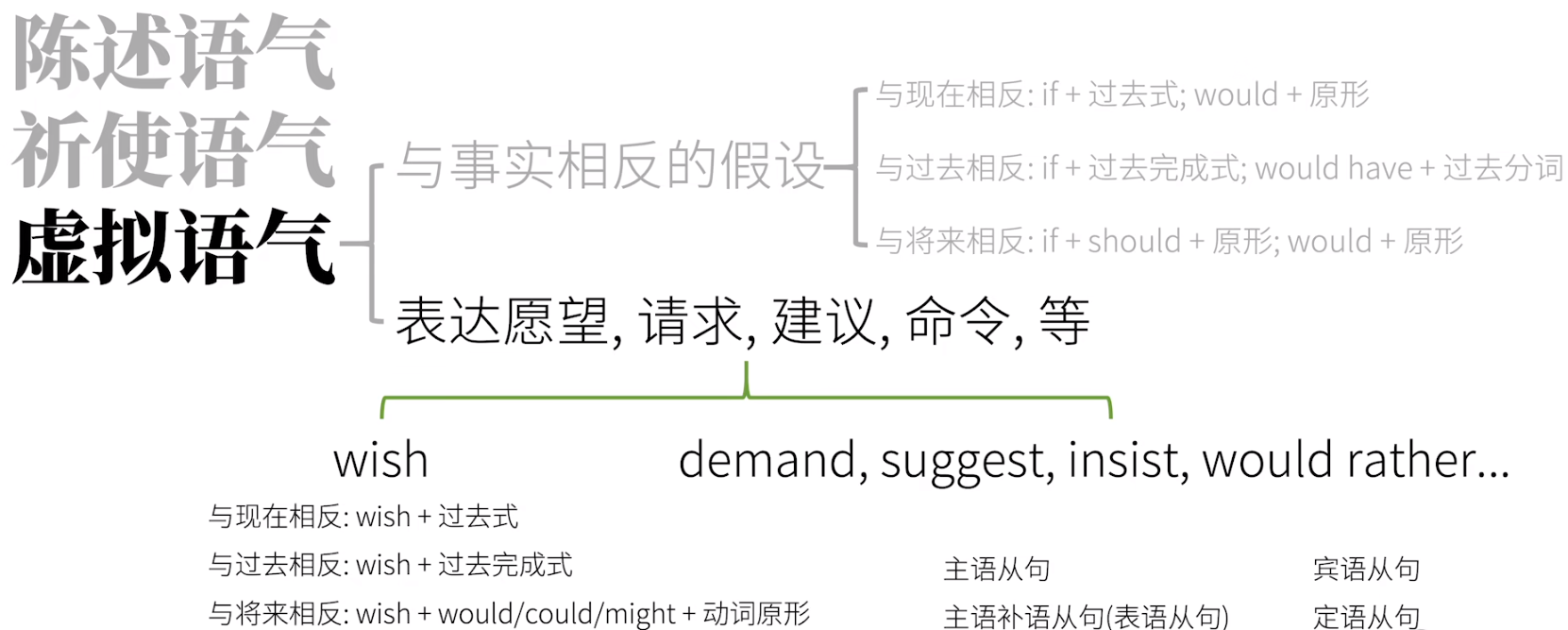
陈述语气(indicative mood)
- 描述现实
- 改变词序或加助动词
- The rabbit ate the carrot. → Did the rabbit eat the carrot?
祈使语气
- 命令/请求
- 用第二人称("你")用一般现在时态
去掉"你",并保证动词原形 -
- You eat the carrot! → Eat thecarrot!
- Yeu don't eat it! → Don't eat it!
- You are quiet! → Be quiet!
虚拟语气
脑中的想法
表不可能假设
- 与现在相反
- 条件句:过去式(am is are都用were);主句:would+动词原形
- I see(表确定) the rabbit now, I will(表确定) bite him. → If I saw(表虚拟) the rabbit now, I would(表虚拟) bite him. 并非过去时间
- 与未来相反;未来可能性很小
- 条件句:should(或were to)+动词原形;主句:would+动词原形
- I see(表确定) the rabbit tomorrow, I will(表确定) bite him. → If I should see(表虚拟) the rabbit tomorrow, I would(表虚拟) bite him.
- 与过去相反
- 条件句:had+动词过去分词;主句:would have+动词过去分词
- I saw(表确定) the rabbit few days ago, I [will(表确定)] have bitten him. → If I had seen(表虚拟) the rabbit a few days ago, I would(表虚拟) have bitten him.
表愿望请求建议命令等
wish(可能性小),hope(中性),would rather
- 对现在
- wish+动词过去式(be是were)
- I wish(表虚拟) that I were a rabbit.
- 对过去
- wish + had/would have+动词的过去分词
- I wish (that) I had eaten the carrot.
- 对将来
- wish +should/would/could/might +动词原形
- I wish (that) I could eat the carrot.
- demand,suggest,insist,order... should+动词原形
- I demand/demanded that you should(可省略) give me a carrot.
- It is suggested that you should(可省略) eat acarrot.
- The suggestion is that you should(可省略) eat a carrot.
5.非谓语动词
不受主语限定的动词,也叫非限定性动词(Non-finite Verbs)
动词不定式
不定式:infinitive,不受时间,人称等概念限制
- 完全不定式(Full Infinitive)
- to+动词原形
- To be or not to be, that is the question
- 裸不定式(Bare Infinitive)
- 省略to
- hear, watch, feel, make, let, help
- You helped me (to) cook the carrot.
不定式充当句子成分
- 作主语
- [To eat a carrot every day] is good for the rabbit.
- 做形式主语
[It] is good for the rabbit [to eat a carrot every day].
- 做主语补语(表语)
- The rabbit's dream is [to eat every kind of carrot in the world].
- 做宾语
- The rabbit likes [to eat carrots].
- I consider [it] important [to eat a carrot every day].
- 不能做avoid、 advise、 consider、 escape、 mind、 practice、 insist on、 give up、 feel like、 put off的宾语
- 不能在介词后使用
The rabbitis fond of to eat carrots ×
- 做宾语补语
- The rabbit expected the wolf [to eat a carrot].
- 裸不定式后宾补可以省略to。
Carrots make the rabbit feel happy.
- 做定语
- The rabbit has a lot of carrots [to eat].
- 做状语
- 表原因
I was surprised [to get a thumbs-up] - 表目的
I will do anything [to get a thumbs-up] - 表结果
I got enough thumbs-up [to make another video]
- 表原因
高级不定式
- to+动词原形 → to+动词变形(态)
- "to be eating a carrot"
- "to have eaten a carrot"
- "to have been eating a carrot"
动名词
形式:动词现在分词, 表主动
- 做主语
- [Eating carrots] is healthy for the rabbit.
- 做主语补语(标语)
- The rabbit's hobby is [growing carrots].
- 做宾语
- The rabbit likes [eating carrots].
- 没有不定式做宾语的限制
- 和不定式做宾语的语义不同
forget to do
forget doing
- 做宾语补语
- The wolf saw the rabbit [eating a carrot].
- 不定式做宾语补语:已发生
动名词做宾语补语:正在发生
- 做定语
- a [sleeping] pill
- 做状语
- 表示时间,原因,条件,结果,逃步,目的,方式和伴随情况等
[Not knowing what to eat], the rabbit skipped lunch.
[Hearing the news], the rabbit became excited.
- 表示时间,原因,条件,结果,逃步,目的,方式和伴随情况等
过去分词
表被动
- 做定语
- a painted room
- 后置定语
过去分词短语做定语,要放到被修饰的名词之后
The carrot cake [eaten by the rabbit] is delicious
- 做主语补语(表语)
- The rabbit is [interested in growing carrots].
- 做宾语补语
- The rabbit found his carrot [stolen]
- 做状语
- [Seen from the hill], the carrot field looks beautiful.
- [Born in a rabbit family], the rabbit has been growing carrots all his life.
- [Given another chance],the rabbit would go to the wolf's party.
独立主格
谓语外其他的动词转为对应的过去分词或现在分词,分词修饰的对象并不是整句主语
- 名词+过去分词
- [The work] finished, the rabbit went home.
The work was finished, and/so the rabbit went home.
After the work was finished, the rabbit went home.
- [The work] finished, the rabbit went home.
- 名词+现在分词
- [The weather] permitting, the rabbit will go out.
If the weather permits, the rabbit will go out
- [The weather] permitting, the rabbit will go out.
- 名词+动词不定式
- The rabbit to come, the wolf is overjoyed.
- 名词+名词
- Many animals went to the party, some of them rabbits and wolves.
- 名词+形容词
- Many animals went to the party, some of them happy.
- 名词+副词
- The rabbit sat on a chair, head down.
- 名词+介词短语
- The rabbit came in, carrot in hand.
6.助动词(Auxilary Verbs)&情态(助)动词(Modal Verbs)
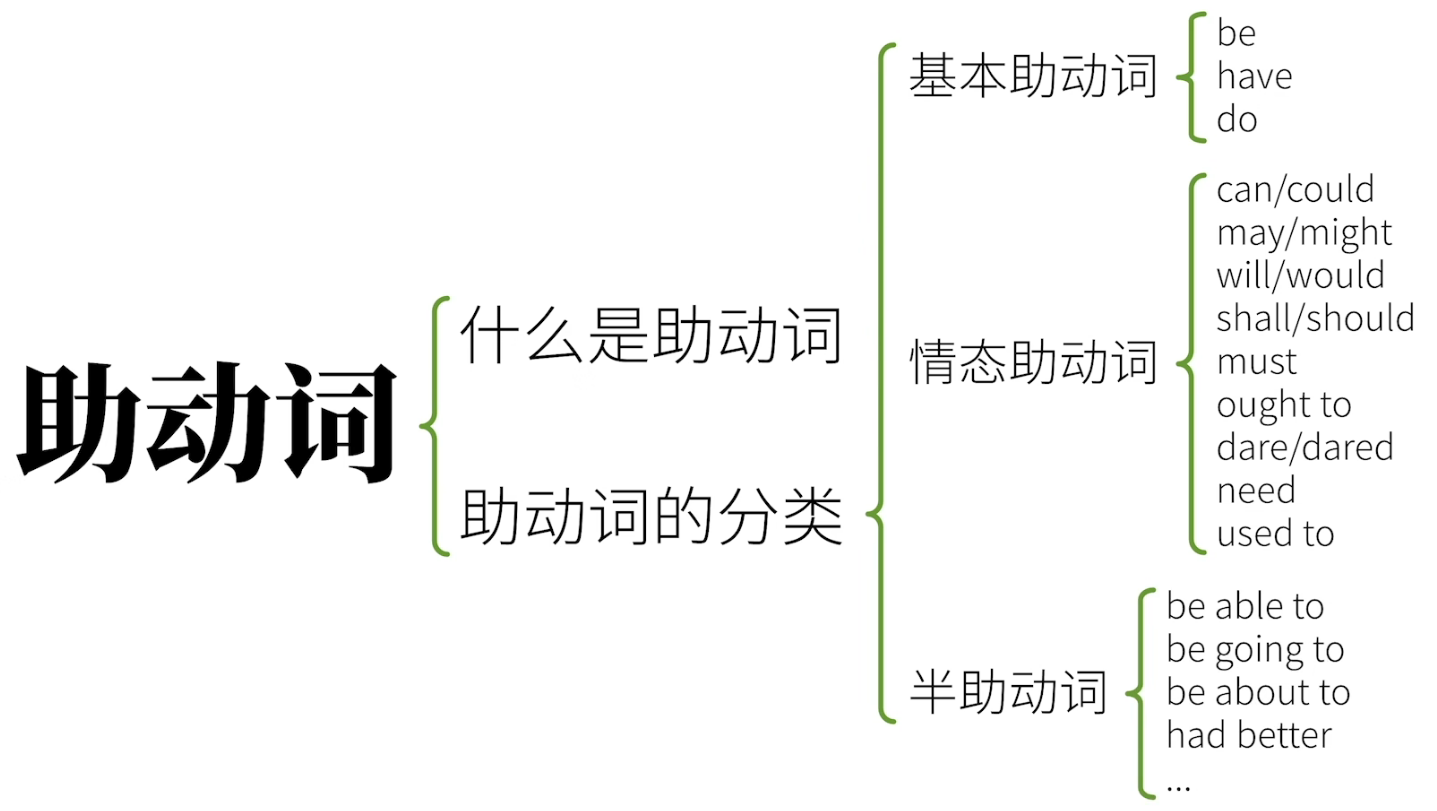
都用于辅助动词,助动词单独无意义,情态动词单独有意义
- The bus will leave at 8PM tonight.
- The rabbit can kill a wolf.
助动词
- be、do、have
- 构成时态、语态、强调
情态助动词
- can/could
- 有能力做、会做
I can kill a wolf. - 表请求或许可
Can/could I borrow your book? - 表可能性,可能性can>could
Anything can happen.
- 有能力做、会做
- may/might
- 表请求或许可
May/might I borrow your book? - 表可能性,可能性小于can,may>might
He may be at home. - 表祝愿,不用might
May you succeed!
- 表请求或许可
- must
- 表必须
You must finish your homework first! - 表禁止,绝对不能
You must not (mustn't) smoke here. - 表推测,一定
The light is on. The rabbitmust be at home.
- 表必须
- will/would
- 构成将来时
The rabbit will eat a carrot. - 表请求建议
Will you lend me that book? - 表推测
Ask him. He will/would know.
- 构成将来时
- shall
- 构成进来时
I shall be there at 9AM. - 征求意见
Shall we meet at 9AM? - 表警告,命令等
You shall not pass!
- 构成进来时
- should
- 表应当
We should treat the rabbit well. - 表有一定根据的推测
It should rain tomorrow. - 表竟然
It's surprising that he should be late. - 构成虚拟语气
If it should rain tomorrow, I wouldn't go.
- 表应当
- ought to
- 表应该,语气更强
We ought totreat the rabbit well.
- 表应该,语气更强
- need
- The rabbit need not wait.
- dare
The rabbit dare~not tell the truth to the wolf. - used to 过去经常
The rabbit used to eat apples.
半助动词
- be able to
- 表将来的能力
I'll be able to reach school on time if I leave right now. - was//were able to...成功做成....
I was able to reach school on time because I left home early.
- 表将来的能力
- be going to(很快)、be about to(更快)、be to(被命令、命中注定)
- 将要做
I am going to graduate in 3 years.
I am about to leave.
You are to finish home work first.
- 将要做
- had better
- 最好做,表忠告
You'd better follow my orders.
- 最好做,表忠告
7.系动词
- 用于赋值
- I am a rabbit.
- The rabbit is smart
- The carrot smells nice.
- keep、stay、seem appear feel、become turn、prove
8.使役动词
使役动词+宾语+宾语补语
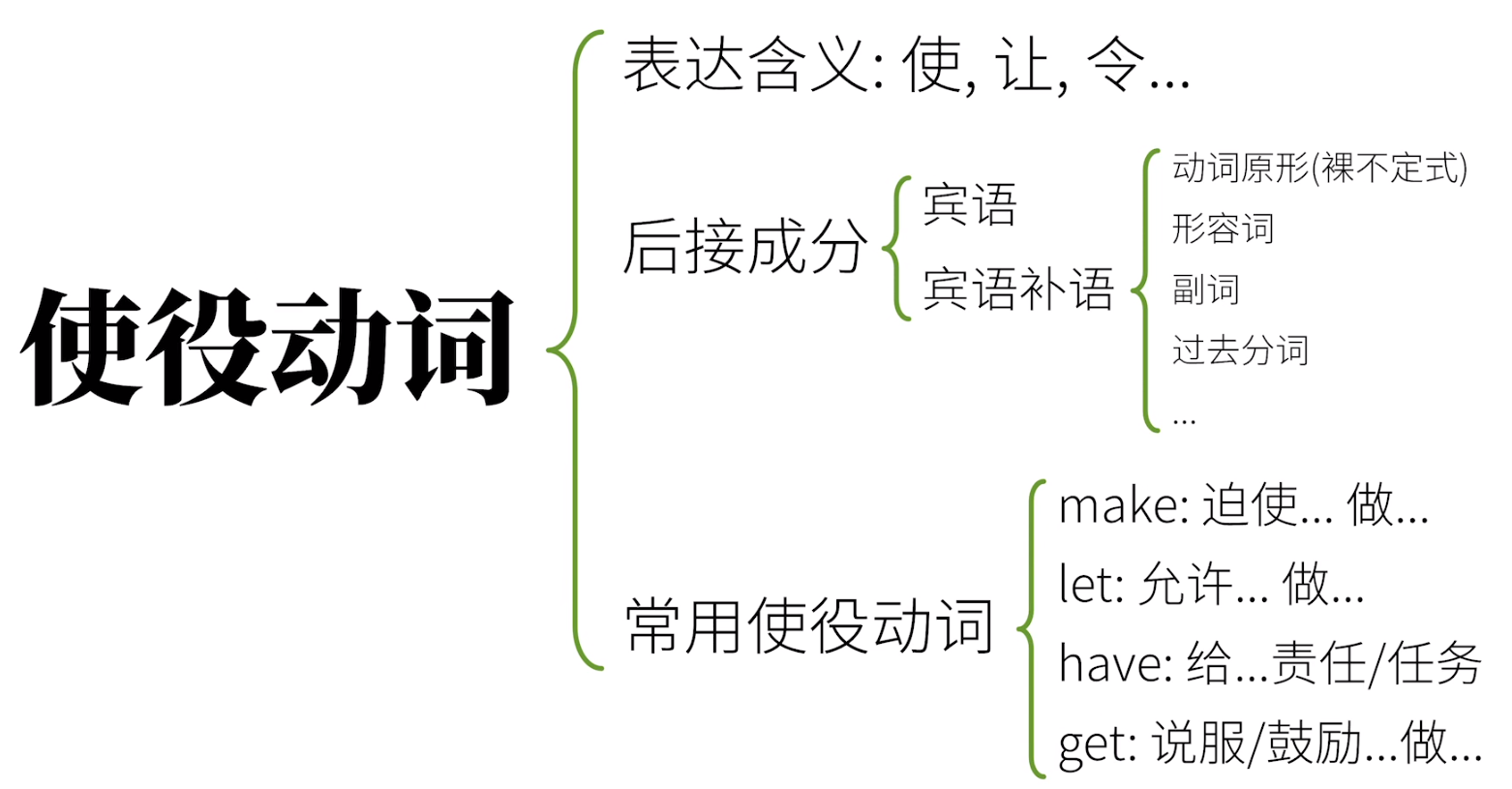
make
- 宾语补语为动词原形/裸不定式(bare infinitive)
- I make the wolf [eat] carrots from time to time.
- 宾语补语为形容词
- The carrot made the wolf [full].
let
- 宾语补语为动词原形/裸不定式(bare infinitive)
- I'll let the wolf [eat] some chocolate.
- 宾语补语为副词
- Let me [out]!
have
- 宾语补语为动词原形/裸不定式(bare infinitive)
- I'll have the wolf [wash] the dishes.
- 宾语补语为过去分词
- I had my car [washed].
get
- 宾语补语为(完整)不定式(full infinitive)
- I'll get the wolf [to clean] the kitchen after she washes the dishes.
- 宾语补语为过去分词
- I got my nails [done].
9.从句
形容词从句(定语从句)
- 关系词
- 关系代词
The rabbit is eating a carrot that I bought.
The teacher who ate a carrot is a rabbit.
The teacher whom I saw yesterday is a rabbit.
The teacher whose favorite food is carrot is a rabbit.
The food which the teacher likes is a carrot.
先行词是唯的:that。如最、全部、唯一、第一
先行词多选:which - 关系副词
This was the place where the rabbit ate the carrot.
This is the reason why the rabbit ate the carrot.
That was the day when the rabbit ate the carrot for the first time.
关系副词=介词+which
This was the place at which the rabbit ate the carrot.
This is the reason for which the rabbit ate the carrot.
That was the day on which the rabbit ate the carrot for the first time.
- 关系代词
- 限定性和非限定性
- 限定性形容词从句
The rabbit ate the carrot which was on the table. 限定范围 - 非限定性形容词从句
The rabbit ate the carrot, which was on the table. 接着说,补充信息
可以做插入语
My head, which is big, is useful when it rains.
可以指代整句
The rabbit ate the carrot, which was not surprising.
- 限定性形容词从句
名词从句
- 主语从句
- 从属连词
That the rabbit ate a carrot is obvious. - 连接代(副)词
Whether the rabbit ate the carrot is obvious.
Where the rabbit ate the carrot is obvious
When the rabbit ate the carrot is obvious
How the rabbit ate the carrot is obvious
Who ate the carrot is obvious.
What the rabbit ate is obvious - 转化为形式主语
It is obvious that the hungry rabbit had already eaten a carrot for dinner this evening
It is obvious whether the rabbit ate the carrot.
It is obvious where the rabbit ate the carrot.
It is obvious when the rabbit ate the carrot
It is obvious how the rabbit ate the carrot.
It is obvious who ate the carrot.
It is obvious what the rabbit ate.
- 从属连词
- 宾语从句
- 包含确定信息
I saw that the rabbit ate a carrot. - 包含不确定信息
I saw whether the rabbit atethe carrot.
I saw who ate the carrot.
I saw what the rabbit ate.
I saw where the rabbit ate the carrot.
I saw when the rabbit ate the carrot.
I saw how the rabbit ate the carrot. - that可省略
I know (that) the rabbit ate a carrot. - 某些词后的宾语从句的否定
否定谓语动词而不是从句 - 主从时态一致
I didn't think (that) you were right.
客观现象的从句是一般现在时
I knew(that) the sun rises in the east - be + 形容词 + that...
I am sure that there's a carrot on the table
- 包含确定信息
- 表语从句
- 系动词为be
The problem is that the rabbit is hungry.
The question is whether the rabbit is hungry.
The question is what the rabbit should eat.
The question is where/when/how the rabbit should eat the carrot - 系动词非be
It seems that the rabbit is hungry.
It feels that you're not telling the truth.
- 系动词为be
- 同位语从句
- 包含确定信息
The fact that the rabbit ate the carrot did not surprise me. - 包含不确定信息
The question whether the rabbit will eat the carrotis on all our minds.
- 包含确定信息
- 宾语补语从句
You can call me what you like.
My education made me who I am today.
副词从句(状语从句)
- 时间副词从句。表时间(如:在...前)
- before
The rabbit ate a carrot at home before the wolf stopped by
Before the wolf stopped by, the rabbit ate a carrot at home. - when, while, as
The rabbit was eating a carrot when I reached home.
When:时间点,"突然"
While:时间段内
As:同时 - after
The rabbit ate a carrot after the wolf stopped by - since
The rabbit has shared three carrots since the wolf stopped by.
从句完成时 - until
The rabbit waited until the wolf stopped by - as soon as
The rabbit will eat a carrot as soon as the wolf leaves. - the next time
The rabbit will share the biggest carrot the next time the wolf stops by.
- before
- 地点副词从句。表地点(如:在...地方)
- where和"强调形式"(wherever, everywhere, anywhere)
The rabbit ate the carrot where he found it.
The rabbit will go wherever he can find a carrot.强调不管哪里
The rabbit sees a carrot everywhere he goes.所有地方
The rabbit can eat a carrot anywhere he likes.任何地方
- where和"强调形式"(wherever, everywhere, anywhere)
- 条件副词从句。表条件(如:如果.)
- if, provided, aslong as, in case
If the rabbit sees a carrot, he will eat it.
Provided thatmy video is excellent,you will give it a thumbs-up.
As long as I make excellent videos,you will remain my follower.
In case you don't understand,please comment below.
- if, provided, aslong as, in case
- 让步副词从句。表让步(如: 虽然... 但是...)
- 假设
Even if I see a carrot, I will not eat it. - 事实
Although I see a carrot, I will not eat it. - 不管如何
No matter what happens, I will not eat the carrot
- 假设
- 方式副词从句。表方式(如:就好像...)
- 假设
I feel good as if I just ate a carrot. - 事实
Eat the carrot as I do.
- 假设
- 比较副词从句。表比较(如: 比...)
- than
He is smarter than me ← He is smarter than I am,
This carrot is bigger than that one ← This carrot is bigger than that one is
She is more beautiful than Snow White ← She is more beautiful than Snow White is. - as ... as
He is as smart as I am.
This carrot is as big as that one is.
She is as beautiful as Snow White is. - the ... the
The more you practice English, the more fluent you become.
- than
- 原因副词从句。表原因(如:因为...所以..)
- because实实在在的因果关系
The rabbit ate the carrot because he was hungry. - since大家都知道的情况
Since you are hungry, you can eat the carrot - as显而易见的事实
As you were not here, we ate the carrot without you
- because实实在在的因果关系
- 目的副词从句。表目的(如:为了...)
In order that I could finish the video in time,I pulled an all-nighter.
情态动词用can, could, may, might, should, would - 结果副词从句。表结果(如: 所以...)
I ate a lot of carrots for lunch so that I wasn't hungry at all in the afternoon.
10.冠词
不定冠词
- 发音
- 元音音素前用an,辅音音素前用a
- 泛指用法
- 泛指某一个人或物
I saw a rabbit. - 泛指某一类
A rabbit is smarter than a wolf.
- 泛指某一个人或物
- 表示1
- I gave you a hundred carrots.
- 主谓一致
- a teacher and video creator is ...
- a teacher and a video creator are ...
- 固定表达
- have a good time
- as a result
定冠词
- 特指
- 再次提及的
- I sawa rabbit.The rabbit ran fast.
- 用在序数词和形容词的最高级前
- the first rabbit
- the biggest carrot
- 独一无二的名词前
- the sun
- the Great Wall
- 泛指
- I like playing the piano西洋乐器.
- The computer has changed our way of life.
- 形容词前表一类人
- the rich
- the poor
- 固定表达
- all the time
- out of the question没门
零冠词
- 泛指物
- Rabbits are smart.
- Computers have changed our way of life.
- Water is important.
- 泛指概念
- Summer is hot. Winter is cold.
- I want to play football概念而不是物品.
- 专有名词
- 固定表达
- from time to time
- out of question毫无疑问